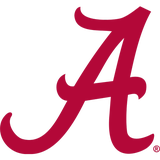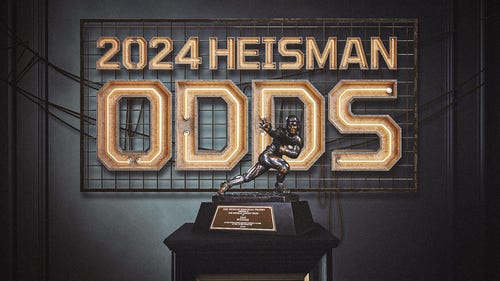
Heisman forecast: Who wins? Expect finalists to finish in this order
Archetypes are part of most Heisman Trophy races, and with three of the major ones covered in this year's competition, Saturday's announcement is even harder to predict than normal.
Alabama's Derrick Henry will be joined by Stanford's Christian McCaffrey and Clemson's Deshaun Watson, a small group that could either mean a landslide victory or an extremely close race.
Here's thinking it's the latter.
Henry is an even more amplified version of fellow Tide alum and 2009 winner Mark Ingram. He's a steady workhorse running back at the forefront of one of the nation's best teams.
Meanwhile, the player Ingram beat out for his trophy, Stanford's Toby Gerhart, is being replicated — and then some — by another record-setting Cardinal back in McCaffrey, who took down Barry Sanders' all-purpose yardage mark.
Watson, like Robert Griffin III in 2011 and, to a degree, Cam Newton in '10 and Johnny Manziel in '12, took a program, put it on his shoulders and lifted it to a different level.
What will voters hold in highest esteem?
● The offensive focal point of the best team in the conference that, defending a national title or not, has defined the sport for nearly a decade?
● An all-purpose monster who brought down a 27-year-old record?
● The quarterback who carried his team to the top seed in the College Football Playoff?
To continue the '09 parallels, that was the closest balloting in history at a mere 28 points. A finalist group of Henry, McCaffrey and Watson, plus a number of strong candidates who didn't make the cut — Florida State's Dalvin Cook, Ohio State's Ezekiel Elliott and Oklahoma's Baker Mayfield — could challenge that mark.
While we voters aren't permitted to reveal our picks until after the ceremony, this isn't indicative of the forecaster's ballot. Rather, this is how the finalists, who are decided upon by the natural break in the voting, figure to stack up:
The nation's leading rusher with an SEC-record 1,986 yards (breaking Herschel Walker's mark), Henry has risen as the Tide has rebounded from their Sept. 19 loss to Ole Miss. That defeat had many believing it signaled the end of Nick Saban's dominance, but instead the team got back to basics and relied heavily upon the running game. Over the past eight SEC games, Henry averaged 32 carries per game. Since that loss to the Rebels, no player has had more rushing yards than the Alabama junior.
The past seven running backs to win — Ingram ('09), Reggie Bush's since-vacated '05 victory, Ron Dayne ('99), Ricky Williams ('98), Eddie George ('95), Rashaan Salaam ('94) and Sanders ('88) — averaged 2,023 yards, and Henry's yards and 23 TDs would be the most since Dayne's 2,034 yards and Williams' 27 scores.
The overall strength of the SEC took a hit this season, but the Tide still played a slate that the NCAA's strength of schedule shows as the second-toughest in FBS. And to underscore the team's reliance on Henry, he was responsible for 60.4 percent of Alabama's 561 rushes. In '09, Ingram had just 45 percent of Alabama's attempts.
The numbers were mind-boggling. McCaffrey racked up 3,496 all-purpose yards — that included 1,847 rushing, 540 receiving and 1,109 on returns — and did so on 410 touches, an average of 8.5 yards per. That's just over Sanders' 8.3 average on 394 touches in totaling 3,249 yards in '88.
McCaffrey had his Heisman-worthy moment in the Pac-12 title game with 461 total yards.
There are two things that ultimately may hurt McCaffrey, though. First was his disappearance in two key games. He had 171 yards on 22 touches (90 of those yards came on kick returns) in the loss to Northwestern, and Notre Dame limited him to 94 on the ground. For voters based in the Midwest, those may have been two of only a few times they saw McCaffrey in action, given that the Cardinal played seven games that started after 10 p.m. ET — and he didn't deliver in those two key contests.
Secondly, there was so much parity in the Pac-12 that it didn't live up to the preseason hype and was shut out of the playoff. The league did get a record 10 teams in bowls, and the Pac-12's overall product is not McCaffrey's fault. But it's an easy narrative that aids the East Coast bias.
McCaffrey was spectacular, but it may not be enough to deliver the first Pac-12 Heisman win by a running back who didn't suit up for USC. It's more likely he instead gives the Cardinal a fourth second-place finish in the past seven years (Gerhart in '09, former Stanford QB Andrew Luck in '10 and '11).
The Tigers were No. 1 in the first CFP rankings of the season, and they enter the postseason as the nation's top-ranked team. While a seventh-ranked defense played its part, their success was largely thanks to Watson.
Why is Watson third on this projection? It comes down to his statistics and what the number of finalists tells us about the voting.
Watson finished with 4,399 yards of total offense and 41 total TDs, which is well below what we've come to expect in this era from trophy-winning passers, who have averaged 4,791 yards and 49 scores with the past five QB recipients (Newton, Griffin, Manziel, Jameis Winston and Marcus Mariota).
To his credit, he was the only Power 5 player to rank in the top 11 in pass efficiency (159.6) and the top 10 in total offense (338.4 per). And while coach Dabo Swinney was tentative with his QBs running early, Watson had four 100-yard games in the past five weeks and in those games averaged 422.5 yards. That included 420 yards and five TDs vs. No. 10 North Carolina in the ACC title game.
But the raw numbers simply aren't what have been deemed Heisman-worthy lately.
And then there's the fact that there are only three finalists.
The voting is broken down into six regions (Far West, Midwest, Southwest, South, Mid-Atlantic and Northeast). If we assume that Watson wins the Mid-Atlantic (where the state of South Carolina and most of the ACC schools reside), that the South goes to Henry and that McCaffrey claims the Far West, it leaves the Midwest, Northeast and Southwest in play.
Note that if Sooners QB Mayfield had won the Southwest, then he'd likely be in New York, and if Buckeyes RB Elliott owned the Midwest, then he'd be there, too.
It's possible Watson can take the Northeast (home to two ACC schools in Boston College and Syracuse), but when Ingram won in '09 he took that region, the South, Mid-Atlantic and Midwest.
Given the SEC's draw and McCaffrey's not coming up big in his two opportunities against teams from the Midwest, the thought here is that Henry takes at least one, if not both, of the Midwest and Northeast.
That should clinch the second Heisman in Alabama history and the fourth for the SEC in seven years.
Follow Cory McCartney on Twitter @coryjmccartney and Facebook









